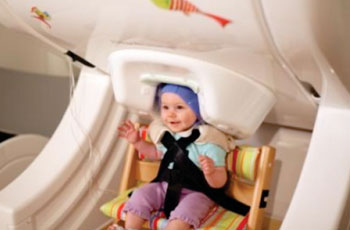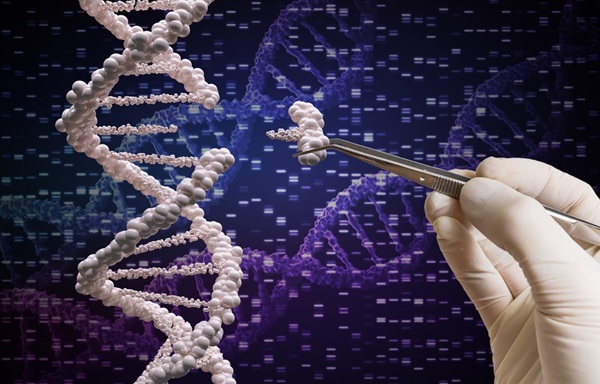Brain Scanner Shows Infants’ Brains Rehearse Speech Sounds Months Before Their First Words
By LabMedica International staff writers
Posted on 30 Jul 2014
New research in 7- and 11-month-old infants revealed that speech sounds stimulate brain regions that coordinate and plan motor movements for speech. The new study suggests that babies’ brains begin establishing the foundation of how to form words long before they actually begin to speak and this may affect the developmental transition.Posted on 30 Jul 2014
Infants notice the difference between sounds of all languages until about eight months of age when their brains begin to concentrate only on the sounds they hear around them. It is not known how this transition occurs, but social interactions and caregivers’ use of embellished “parentese” manner of speech appear to help.

Image: A one-year-old baby sits in a brain scanner, called magnetoencephalography (MEG)—a noninvasive approach to measuring brain activity. The baby listens to speech sounds such as “da” and “ta” played over headphones while researchers record her brain responses (Photo courtesy of the Institute for Learning & Brain Sciences at the University of Washington).
The study’s findings were published July 14, 2014, in the Proceedings of the National Academy of Sciences of the United States of America. “Most babies babble by seven months, but don’t utter their first words until after their first birthdays,” said lead author Dr. Patricia Kuhl, who is the co-director of the University of Washington’s (UW; Seattle, USA) Institute for Learning and Brain Sciences. “Finding activation in motor areas of the brain when infants are simply listening is significant, because it means the baby brain is engaged in trying to talk back right from the start and suggests that seven-month-olds’ brains are already trying to figure out how to make the right movements that will produce words.”
Dr. Kuhl and her research colleagues think this practice at motor planning contributes to the transition when babies become more sensitive to their native language. These findings stress the importance of talking to kids during social interactions even if they are not talking back yet. “Hearing us talk exercises the action areas of infants’ brains, going beyond what we thought happens when we talk to them,” Dr. Kuhl said. “Infants’ brains are preparing them to act on the world by practicing how to speak before they actually say a word.”
In the research, infants sat in a brain scanner that measures brain activation through a noninvasive technique called magnetoencephalography (MEG). The brain scanner resembles an egg-shaped old-fashioned hair dryer and is completely safe for infants. The Institute for Learning and Brain Sciences was the first in the world to use such a tool to study babies while they engaged in a task.
Each of the infants, 57 7- and 11- or 12-month-olds, listened to a series of native and foreign language syllables such as “da” and “ta” as researchers recorded brain responses. They listened to sounds in English and in Spanish. The researchers examined brain activity in an auditory area of the brain called the superior temporal gyrus, as well as in Broca’s area and the cerebellum, cortical regions responsible for planning the motor movements required for producing speech.
This pattern of brain activation occurred for sounds in the seven-month-olds’ native language (English) as well as in a non-native language (Spanish), showing that at this early age infants are responding to all speech sounds, whether or not they have heard the sounds before.
In the older infants, brain activation was different. By 11-12 months, babies’ brains increase motor activation to the non-native speech sounds comparative to their native speech, which the researchers interpret as showing that it takes more effort for the baby brain to forecast which movements create non-native speech. This reflects an effect of experience between 7 and 11 months, and suggests that activation in motor brain areas is contributing to the transition in early speech perception.
The study has social implications, suggesting that the slow and exaggerated-style of parentese speech-- “Hiiiii! How are youuuuu?”--may actually prompt infants to try to synthesize utterances themselves and imitate what they heard, uttering something like “Ahhh bah bah baaah.”
“Parentese is very exaggerated, and when infants hear it, their brains may find it easier to model the motor movements necessary to speak,” Dr. Kuhl said.
Related Links:
University of Washington














